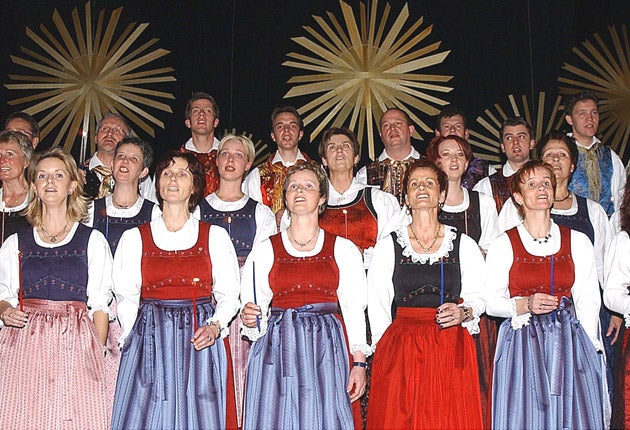Modern-day Von Trapps fight Austrian far right
Choir uses music to promote tolerance, reports Vanessa Mock

Your support helps us to tell the story
From reproductive rights to climate change to Big Tech, The Independent is on the ground when the story is developing. Whether it's investigating the financials of Elon Musk's pro-Trump PAC or producing our latest documentary, 'The A Word', which shines a light on the American women fighting for reproductive rights, we know how important it is to parse out the facts from the messaging.
At such a critical moment in US history, we need reporters on the ground. Your donation allows us to keep sending journalists to speak to both sides of the story.
The Independent is trusted by Americans across the entire political spectrum. And unlike many other quality news outlets, we choose not to lock Americans out of our reporting and analysis with paywalls. We believe quality journalism should be available to everyone, paid for by those who can afford it.
Your support makes all the difference.They may not be a family and they will never be forced to flee Austria, but just like the Von Trapps, an Alpine choir is taking on their country's growing far right through the sound of music. The Oisternig Choir says its mission is to foster tolerance at a time when Austrian voters are expected to endorse two far-right parties in this weekend's European elections.
The choir is based in Carinthia, the rural region on the Italian-Slovenian border nicknamed "Haiderland" on account of being the heartland of the late right-wing politician, Jorg Haider.
Despite the death of the charismatic leader in a car crash last year, his Future of Austria Party saw its popularity soar in recent regional elections when nearly half of Carinthians voted for it, and it is hoping to win at least one seat in the European Parliament. Strong gains are also predicted for the Freedom Party, which is set to scoop nearly 20 per cent of the vote, thanks to its similarly strident Eurosceptic and anti-immigration message.
As they put down their song sheets and stop for a break, the choir members explain how they have brought old Slovenian folk songs back to life in an attempt to challenge the stigmatisation of the Slovenian language and culture in Carinthia.
The border between Slovenia and Austria has shifted ever since the days of the Austro-Hungarian Empire and Slovenian was effectively banished from the region after 1945 following bitter clashes with the former Yugoslavia during the two world wars.
"The border with the former Yugoslavia may be gone, but it's still very much there in people's minds. German-speaking Carinthians are really afraid of the Slovenians. They simply do not want to communicate with them," says Dominic Egger, a 24-year-old baritone.
"I've even been told off by people here for attending Slovenian music concerts, as if it was unpatriotic," adds Daniele Assek, a soprano, who fears that the rise of Austria's far right is fanning deep-seated regional tensions. "That's why we've decided to sing in Slovenian to make it clear to everyone that this is also part of our identity, which should be embraced, not rejected."
There is no shortage of anecdotal evidence about the local wrangles. Mr Egger explains that his girlfriend is sometimes reprimanded for speaking Slovenian in public, while another choir member says he has been told by passers-by not to speak Slovenian to his children.
It is a concern shared by Pepca Druml, a local historian who runs the hotel in the village of Feistritz-an-der-Gail where the 63 Oisternig singers rehearse. "Just one century ago, this was a mainly Slovenian-speaking region. But the Second World War changed all that, many Slovenians were deported and it was decided that Slovenians would speak only German," she says.
The rise of the Austrian far right is also worrying Slovenia, which can be reached by driving a few kilometres over a mountain pass where the formerly heavily guarded border posts now stand empty. "I simply do not understand their politicians," says Jure Zerjav, the mayor of Kranjska Gora, a neighbouring Slovenian town. "They are always trying to dig up old problems and trying to talk up how dangerous the Slovenian minority is. The current economic crisis is only making things worse."
The singers say the atmosphere is gradually improving and expect the far right's gains to be short-lived. "I think the problem that exists now will not exist in 20 years," says Mr Egger.
Join our commenting forum
Join thought-provoking conversations, follow other Independent readers and see their replies
Comments